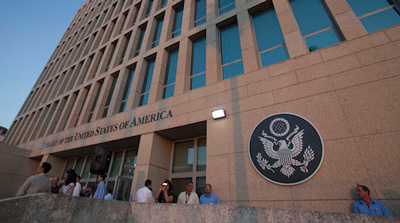
What is the U.S. embassy in Havana now good for?
HAVANA – In general, American embassies around the world stand as fortresses. Security belts with barbed wire fences, obstacles to traffic, weapons’ and explosives’ detectors, as well as sentry boxes with marines carrying sophisticated war rifles, serve as a prelude to entry into these diplomatic precincts.
This is not the case in Cuba. The six-story building with large glass windows inaugurated in 1953 has hardly undergone changes. It is located in Havana’s Malecón, one of the busiest areas of the city. Access is direct from the street, and security is provided by Cuban police forces stationed on the sidewalks that surround it. It is common to find diplomats and marines running in front of the seawall. Not even in Washington do they seem to feel safer.
However, the U.S. government has just formalized the decision to reduce its personnel by 60% and prohibit families from accompanying personnel there since they run great dangers due to the alleged “sonic attacks” they themselves can not explain and that only occur in Cuba. And although they do not blame the Cuban government for provoking these attacks, the decision includes the demand for a similar reduction in the Cuban embassy in Washington.
Lots of fables have been woven around these attacks. The Cuban side, which has conducted its own investigations and cooperated with the U.S. government, considers it a “political fabrication” without any basis in reality. The only clear thing here is that it has served as an excuse to minimize relations between the two countries.
Based on these circumstances, the United States closed its consulate in Havana. The situation makes it impracticable to comply with the 20,000 annual visas established through the 1994 migration agreement; a fact that has already been officially communicated to the Cuban government. Now the handling of these visas must go through a complex and expensive process that ends in Colombia, where applicants must complete the procedures.
The situation is even worse for those who wish to apply for visas to travel temporarily to the United States to visit relatives residing in that country. Due to the existence of the dry foot / wet foot policy, the possibility of a “potential migrant” had significantly reduced the granting of these visas in recent years. More than 80% were being denied placing Cubans among the least accepted visitors in the world.
Due to the elimination of the wet foot/ dry foot policy by Barack Obama in January 2017, a greater opening was expected. But then came the ‘sonic attacks’ and now Cubans must make this request from a consulate abroad without guarantees that it will be accepted — practically eliminating the possibility.
In other words, those who until recently were considered ‘migrants with an exceptional reason’ due to the supposed American desire to contribute to family reunification and to help Cubans “escape the communist hell” are today among the most restricted in access into U.S. territory. And although Cuba does not appear among the countries banned by Donald Trump’s immigration policy, the result is the same.
The same happens with academic and cultural contacts, since a Cuban invited by a North American counterpart can not attain his visa in Cuba, therefore adding expenses and inconveniences to this affair. Add to this is the travel warning issued by the State Department, which has cut in half visits by universities and ‘people to people’ contacts — something that the United States claims will inoculate Cubans with the virtues of the ‘American Way of Life’ and would be an incentive for the development of private businesses on the Island.
Even the so-called ‘dissident groups,’ who previously enjoyed special access to the embassy, now complain that they have lost contact with U.S. officials and can not manage to get their visas to travel to the United States.
If the U.S. Embassy acts on a premise that hinders relations with its Cuban counterpart and does not provide consular services; fails to comply with migratory agreements; limits people-to-people contacts; hinders the scarce existing economic relations; and it even harms the development of its own lines of influence with respect to Cuba: then it’s fair to ask what the United States Embassy in Havana does right now?
What prevails is great confusion, in line with what is happening in the U.S. foreign service. The CIA, like the FBI and other security agencies, have been questioned and criticized by the president, establishing an explosive relationship, whose consequences are unpredictable. The State Department, for its part, is figuratively bankrupt, reflected by the lack of appointments and the resignation of some of its most experienced officials, especially in Latin America.
There are those who take advantage of these situations. These unfilled appointments are being taken by the old guard, conservative hawks who once “Cubanized” the policy toward Latin America. Their priority being the overthrow of the Cuban government and its guidelines, now also the Venezuelan one, and taking advantage of their historical contacts with the Latin American extreme right. The so-called Cuban-American lobby played and still plays a key role in this train of thought, which again has a key and active role in the politics against Cuba.
Obama’s decisions aimed at “normalizing relations with Cuba” were met with satisfaction by the U.S. officials in charge of applying this policy. Those included many stationed in Cuba that, according to press reports, have expressed interest in remaining in the country. It is no surprise then that Marco Rubio declared that in order to advance his positions against Cuba, he had to overcome the resistance of the government “bureaucracy”.
If the sonic attacks produced by secret weapons are questionable, there is no doubt then that the American diplomats serving in the Havana embassy are now really being affected by the noise coming from Washington. Well, at least to mitigate the stress, they can continue running along the Malecón.
Photo by Ismael Francisco / Cubadebate

